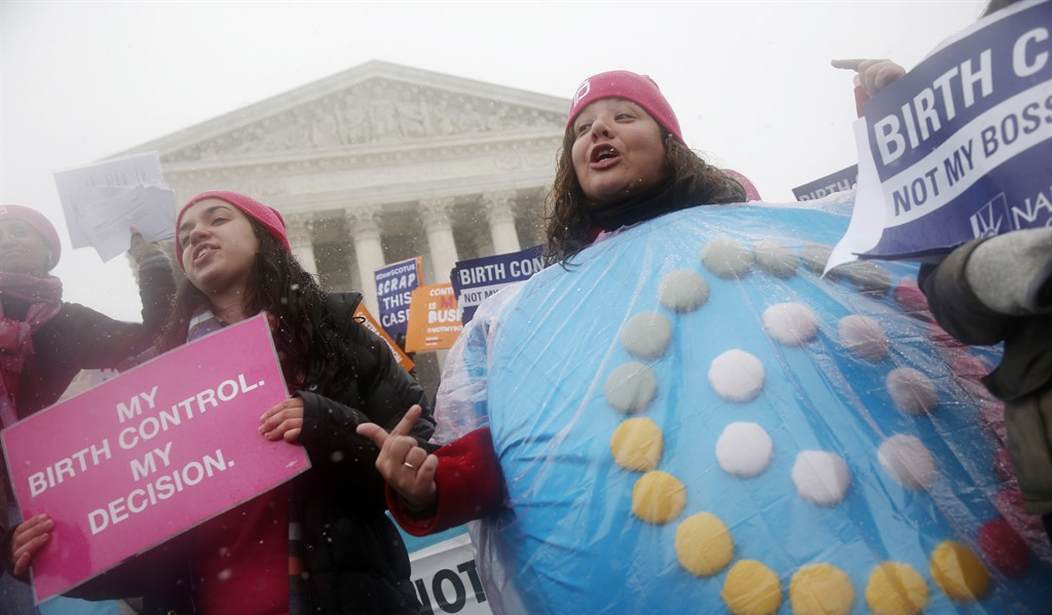At first blush it’s weird that a bill guaranteeing access to contraception bill got a mere eight Republican votes today when the gay marriage bill that passed two days ago got 47. Gay marriage is the more contentious issue, no? That one polls at around 70 percent across the population with only a narrow majority of Republicans in favor. Meanwhile, a new poll from UPI finds 84 percent of Republicans support safe access to contraception, with 73 percent “strongly” supportive. Democrats weren’t polled but their numbers are doubtless even higher. This a near-unanimous issue among votes, in other words.
So what gives? Eight votes for the contraception bill and 47 for gay marriage?
228-195-2, House votes to guarantee rights to contraceptives. 8 Rs vote yes; two vote present. The 8, per @kristin__wilson: Liz Cheney, Nancy Mace, Fred Upton, Anthony Gonzalez, John Katko, Brian Fitzpatrick, Maria Salazar and Adam Kinzinger. Two present: Bob Gibbs and Mike Kelly
— Manu Raju (@mkraju) July 21, 2022
We’ll see how Republicans who voted no end up justifying having done so. Some will likely say that they’re trying to put a stop to these Democratic “show votes” on privacy issues by refusing to consider a matter like contraception access until it’s a live issue somewhere in the U.S. But Pelosi and her party are fine with that. So long as they can truthfully say in their attack ads this fall, “Nearly every Republican in the House voted against a right to access contraception,” they got what they were after.
Other Republicans may end up drawing a constitutional distinction between the two bills. The gay marriage bill passed pursuant to Article IV, Section 1 of the Constitution, which reads, “Full faith and credit shall be given in each state to the public acts, records, and judicial proceedings of every other state. And the Congress may by general laws prescribe the manner in which such acts, records, and proceedings shall be proved, and the effect thereof.” The bill requires a state to recognize the lawfulness of a marriage so long as it’s lawful in the state where it was entered into, which means gay couples in red states can get married in blue ones and then require their local government to recognize their marriage as valid.
There’s no similar “full faith and credit” issue at stake in the contraception bill, which you can read here. That one was passed under the Commerce Clause and Section 5 of the Fourteenth Amendment, which empowers Congress to enact statutes to enforce the provisions of the Due Process Clause. But the “substantive due process” argument is rickety after Dobbs, particularly in light of Clarence Thomas’s concurrence. Is there a right to contraception that’s “deeply rooted” in the history and traditions of the United States? If not, Congress would lack power under Section 5 to enforce that right.
The Commerce Clause argument is stronger but SCOTUS’s jurisprudence on the subject is convoluted and hard to predict. Over the last 30 years, the conservative majority has read the clause more narrowly than liberal courts of the past. Undoubtedly, Congress can claim some power to regulate interstate commerce involving contraception, but can it lay down a blanket rule for all 50 states like today’s bill does that declares “A person has a statutory right under this Act to obtain contraceptives and to engage in contraception, and a health care provider has a corresponding right to provide contraceptives, contraception, and information related to contraception”? Maybe some Republicans who voted no sincerely believed that exceeded Congress’s authority.
Some likely found the long preamble in the bill a bridge too far as well. The gay marriage bill that passed on Tuesday was smartly drafted, without any liberal bells and whistles. It was a short, by-the-book recitation of how full faith and credit should operate with respect to marriage. Today’s contraception bill is … not like that. Sample quote:

Rhetoric about “historically marginalized groups” typically isn’t aimed at winning over a Republican audience. Another part of the preamble complains that “Providers’ refusals to offer contraceptives and information related to contraception based on their own personal beliefs impede patients from obtaining their preferred method,” which would prioritize contraception access over a religious believer’s freedom of conscience. That would also understandably put righties off the bill.
Even the section on definitions is potentially problematic. “Contraceptives” is defined very broadly as “any device or medication used to prevent pregnancy, whether specifically used to prevent pregnancy or for other health needs, including all contraceptive products approved, cleared, or granted de novo classification by the Food and Drug Administration, such as oral contraceptives, long-acting reversible contraceptives, emergency contraceptives, internal and external condoms, injectables, vaginal barrier methods, transdermal patches, and vaginal rings, or other contraceptives.” Does that include abortifacients? IUDs too, some of which prevent implantation of a fertilized egg?
Of the eight House Republicans who voted yes, five voted to impeach Trump and all of them are either retiring or are certain to be sent into retirement soon. The most notable — and vocal — vote in favor came from Nancy Mace, who beat back a Trump-supported challenger in her primary last month and came to work today looking like this:
My state is banning almost all exceptions for women including who’ve been raped & victims of incest. Today I voted to protect access to contraceptives – to protect every woman in South Carolina. You can’t ban abortion and then not protect women’s access to contraceptives. pic.twitter.com/e0UTjz2cM6
— Rep. Nancy Mace (@RepNancyMace) July 21, 2022
Mace’s home state of South Carolina currently has a six-week abortion ban but the legislature is moving towards a total ban with an exception only in cases where the mother’s life is at risk. If you’re going to take a zero-tolerance approach to terminating unwanted pregnancies, says Mace, you need to be generous in giving people ways to avoid those unwanted pregnancies before they happen. Perfectly logical…
…but maybe uncomfortable for parts of the pro-life coalition. I continue to think there are three camps leading the charge to ban abortion — the people focused on preventing abortions; the people focused on deterring sexual behavior that makes abortion more common; and the people who just want to own the libs and drink their tears. The first two groups are potentially divided on the subject of contraception. If scientists developed foolproof, dirt-cheap birth control and made it easy to access, the first group would rejoice for the same reason Nancy Mace voted yes today: Better, freely accessible birth control means fewer pregnancies, which means fewer abortions. But the second group would be conflicted. Sure, sure, fewer abortions — but also fewer children and more casual sex, and therefore maybe less family formation. Banning abortion raises the cost of sex; ubiquitous birth control would lower it. How many of the Republicans who voted no today are in that second group?







Join the conversation as a VIP Member